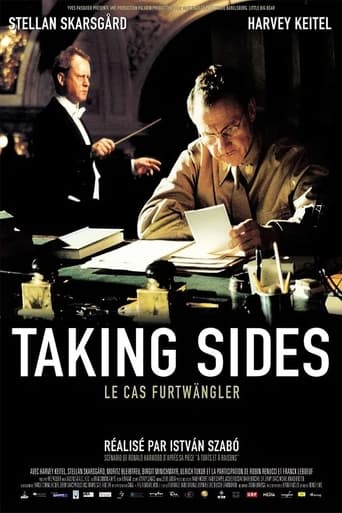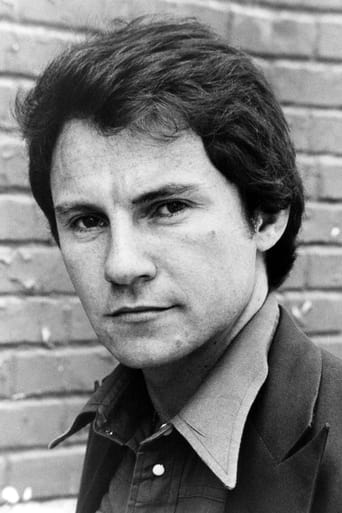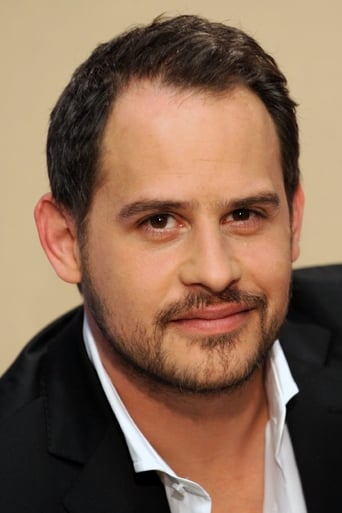Taking Sides (2002)
One of the most spectacular and renowned conductors of the 1930s, Wilhelm Furtwangler's reputation rivaled that of Toscanini's. After the war, he was investigated as part of the Allies' de-Nazification programme. In the bombed-out Berlin of the immediate post-war period, the Allies slowly bring law and order to bear on an occupied Germany. An American major is given the Furtwangler file, and is told to find everything he can and to prosecute the man ruthlessly. Tough and hard-nosed, Major Steve Arnold sets out to investigate a world of which he knows nothing.
Watch Trailer
Free Trial Channels
Cast


Reviews
Who payed the critics
SERIOUSLY. This is what the crap Hollywood still puts out?
One of the worst movies I've ever seen
A lot of perfectly good film show their cards early, establish a unique premise and let the audience explore a topic at a leisurely pace, without much in terms of surprise. this film is not one of those films.
I give 5 to the movie just for the sake of the interpretation which is of course outstanding. But as far as the script is concerned this movie misses the point.I don't know who were the guys in charge of the hearings when Fürtwängler was prosecuted. But I do hope they were not such stupid, uncultured guys like the major in the movie. The Wikipedia paper about the movie gives two views of the critics of this movie as follows:Roger Ebert found the movie "both interesting and unsatisfying. The Keitel performance is over the top, inviting us to side with Furtwängler simply because his interrogator is so vile. There are maddening lapses, as when Furtwängler's rescue of Jewish musicians is mentioned but never really made clear. But Skarsgård's performance is poignant; it has a kind of exhausted passivity, suggesting a man who once stood astride the world and now counts himself lucky to be insulted by the likes of Major Arnold."Mick LaSalle of the San Francisco Chronicle finds that the movie's promise to provide a balanced argument "goes unrealized, and all we're left with is the spectacle of an idiot bullying a genius. Harvey Keitel's performance as the smug, self-satisfied major is terribly miscalculated, unless he intended for us to loathe the spectacle of a small, stupid man glorying in his sudden power. That's possible. Stellan Skarsgård plays Furtwängler with an air of exhaustion that seems a generous attempt to justify the script's weakness, that the conductor doesn't defend himself vigorously enough. Of the two men, it's the major who acts more like a Nazi."I think they resume very well the great errors of this film. I doubt any judge would act like this and pretend to try to do a fair inquest. It doesn't make sense.The director and his scriptwriter had many documents to help them build a credible and authentic account of what happened and they just missed it.In conclusion: astounding interpretation for a very poor scenario
Bombs can be heard in the distance as Beethoven's Fifth Symphony is being performed in a church in Berlin near the end of World War II. The conductor, Wilhelm Furtwangler, portrayed by Stellan Skarsgard, continues the performance despite the wailing of air raid sirens and a spotlight scanning the windows. It is only a power failure and a darkened hall that ends the concert. Back in his room, the conductor is warned by Hitler's architect, Albert Speer, that it might be better if he take a trip out of the country and "get some rest." This scene opens the film Taking Sides, a fictional account of the investigation by Allied officials at the end of the war to find and punish Nazi collaborators as part of its "De-Nazification" program. No musician could work professionally until they had been cleared by the Allies and Dr. Furtwangler, who had remained in Germany during the war, was no exception. Directed by Istvan Szabo and based on a play by Ronald Harwood who also wrote the screenplay, the pre-trial investigation focuses on the role of the artist in a totalitarian society, specifically, whether it is more effective to leave the country in protest or remain to work against the oppressive government from within.The film relies heavily on three interrogation session conducted in an office above a museum between an overbearing investigator, U.S. Major Steve Arnold (Harvey Keitel), and a proud but humbled Furtwangler, perhaps the greatest conductor of his time and the last, great exponent of the German Romantic school. Under orders from his superior, a U.S. general (R. Lee Ermey), to "nail the bandleader" and hold all Germans responsible for their war crimes, Arnold keeps Furtwangler waiting outside his office, contemptuously calls him "Wilhelm" and talks to him as if he was personally responsible for the gassing of millions of Jews.Arnold's aides, Lt David Wills (Moritz Bleibtreu), a repatriated German Jew, and Emmi Straube (Birgit Minichmayr), the daughter of an officer who was executed for his involvement in the plot to kill Hitler, support the investigation but eventually express their distaste for Arnold's methods and try to bring a sense of compassion to the proceedings. Though the film engages in spurious speculations such as whether or not Furtwangler's secretary procured women for his pleasure before each concert and whether damaging evidence lurks in a "Hinkel archive," the real thorn of contention is that the conductor remained in Germany during the war while other famous conductors such as Otto Klemperer, Arturo Toscanini, Fritz Busch, Bruno Walter, and Erich Kleiber left. Some were Jews who had no choice. Others left out of conscience.As the prosecution shows newsreel clips of victims of the holocaust being thrown into mass graves, Furtwangler, a deeply conflicted man, becomes more and more on the defensive. When he is brutally questioned by Arnold about the high posts he accepted in the government, the concert he gave to celebrate Hitler's birthday, and the fact that his recording of the Adagio from the Bruckner Seventh was broadcast to the nation after Hitler's suicide, Furtwangler says that no one who was not in his shoes could appreciate "the tightrope he walked between exile and the gallows." He asserts that he was only a pawn in the power struggle between Goebbels and Goring, and that his continued presence in Germany was desperately needed to keep the spirit of resistance alive and nourish the soul of the German people in the midst of barbarism.In support of their conductor, musicians from the Berlin Philharmonic testify that Furtwangler was a man of high ideals who disdained politics, refused to join the Nazi Party, give the Nazi salute, or conduct concerts in Nazi-occupied countries, and helped countless Jewish musicians in need of money, employment, or an exit visa out of Germany. Though strong points are made on both sides, Szabo stacks the deck in one direction by portraying the major as a bullying and cynical Philistine in contrast to the intelligent and highly articulate artist (not the case in real life). By the time of the final session, Arnold has descended into little more than a self-righteous bully.The film ends with a postscript. It is Berlin, 1942, a different world than any of us know. The conductor is the real Wilhelm Furtwangler, a tall, gaunt looking man with only a patch of hair on his balding head standing astride the podium, a baton in his hand. In the audience are Nazis Heinrich Himmler, the chief of the SS, and Joseph Goebbels, the Nazi propaganda minister. Conducting a performance of Beethoven's Ninth Symphony, a work of titanic spiritual struggle, Furtwangler does everything to guide the orchestra towards the realization of Beethoven's humanity. The musicians, however, as if possessed, unleash every ounce of the work's inner fury with reckless abandon.A long scream echoes through the hall, Alle Menschen werden Bruder, Wo dein sanfter Flugel weilt! (All the people will be brothers, dwelling under your gentle wing). In this setting, the words could not be more steeped in irony. It is an ode to joy but there is no joy, only a cry of pain reflecting the outrage, the hopelessness of the moment. It is the tormented expression of an orchestra and its conductor saying farewell to a country and a promise they can no longer believe in. Though Furtwangler was eventually exonerated, exhausted and overwhelmed by the weight of memory, unable to protect his reputation in spite of support from many Jewish artists such as Yehudi Menuhin, the greatness that rightfully belonged to him would forever remain elusive.
My husband and I discussed this movie into the wee hours of the morning. We were very impressed by Harvey Keitel's performance in particular, (a "you can't handle the truth" moment!). Liked the way the characters were representative of people at the time, i.e. Keitel's character representing world outrage and disgust, determined to not only be "seen to be just" but to exact justice; Bleibtreu's supposed Jewish apathy, his admiration for Furtwangler impossible to conceal; Skargard's naivety in believing the purity of art could be kept separate from politics; Emmy's guilt; the second violinist admitting opportunities were opened up for his inclusion into the orchestra. Loved the end narrative and particularly last bit before the credits ran.
Major Steve Arnold tells his assistant in one of the bar room scenes to "Grow Up - F----n Grow up", the time has long since passed for equivocation on the Furtwenglers of this world. Notwithstanding the merits or demerits of the film in cinematic terms, these I believe are the most telling words of the entire debate. What if all the singer songwriters who opposed the Vietnam war had wrung their hands in anguish wondering what the right thing to do was? When all the while the draft lottery was proceeding apace. When the noble conductor was wiping his hands at the end perhaps he was trying to wipe away his guilty conscience. There is a time when black and white logic, clear thinking and action are necessary, not the murky greyness of moral duplicity. As Nero fiddled, Rome burned. As Furtwengler conducted - the people in the gas chambers were squealing to accompaniment of the violins in Berlin!








